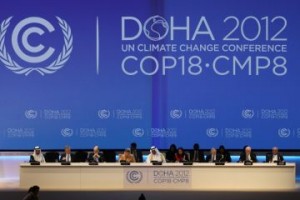 International climate talks between some 200 nations, ended last week after closing with a marathon 36 hour session. Nations from around the world met to discuss carbon emissions and global warming. What came out of the talks? First of all, the 1997 Kyoto Protocol, which places limits on some greenhouse gas emissions of developed countries, was extended to 2020. It was set to expire the end of this year. This is significant because many industrialized nations will continue to pursue their carbon reduction goals under the Protocol, while the attention of future climate talks can focus on amending the treaty to include developing countries. A new treaty is tentatively set to be adopted in 2015 and take effect five years later, though no concrete details have been made as of yet.
International climate talks between some 200 nations, ended last week after closing with a marathon 36 hour session. Nations from around the world met to discuss carbon emissions and global warming. What came out of the talks? First of all, the 1997 Kyoto Protocol, which places limits on some greenhouse gas emissions of developed countries, was extended to 2020. It was set to expire the end of this year. This is significant because many industrialized nations will continue to pursue their carbon reduction goals under the Protocol, while the attention of future climate talks can focus on amending the treaty to include developing countries. A new treaty is tentatively set to be adopted in 2015 and take effect five years later, though no concrete details have been made as of yet.
“This is not perfect, but it is genuine progress,” said Ed Davey, the UK energy and climate change secretary. “It’s a bigger step forward than people have given us credit for. We wanted to pave the way for the future [discussions on a new global treaty] and we’ve done that.”
China is a good example of why the inclusion of developing countries is significant. They maintain that they are a developing nation, and while they still have millions living in extreme poverty, they are the largest producers of greenhouse gas emissions worldwide, as well as, being on track to becoming the world’s largest economy. In the past they would not be included in the Kyoto Protocol, but future negotiations will take nations like China into account.
Secondly, new text was added on “loss and damage,” a relatively new idea that calls for the biggest polluters to give financial aid to poorer nations affected by climate change, especially island nations that are losing land to rising sea levels. It was this addition that accounted for the final 36 hour session. The U.S. fought back on adding such a clause because being the world’s second largest carbon emitter, behind China, they fear they could be stuck with the reparation bills to compensate smaller nations. In fact, the U.S. made certain no terms such as “compensation” or any other wording in the treaty would leave them legally liable to these countries. The text uses the term “aid” instead, which assumes no financial responsibility.
Though the new text was added, no logistics were decided upon and it left many smaller nations concerned about how much aid they would actually receive.
“This is not where we wanted to be at the end of the meeting, I assure you,” said Nauru Foreign Minister Kieren Keke, who leads an alliance of small island states. “It certainly isn’t where we need to be in order to prevent islands from going under and other unimaginable impacts.”
Also, this second phase of the Kyoto Protocol is only expected to cover 15% of the carbon emissions from industrial nations after Canada, New Zealand, Russia and Japan opted out. Russia was opposed rules limiting carbon credits.
While many feel that little in the way of action on the issues was actually accomplished by the climate talks, for the first time in history, there is a worldwide acceptance of human actions causing global warming and some agreement that those causing the most damage, should be paying for it.
“We ask the negotiators in Doha: Which planet are you on? Clearly not the planet where people are dying from storms, floods and droughts. Nor the planet where renewable energy is growing rapidly and increasing constraints are being placed on the use of dirty fuels such as coal. The politicians and negotiators have lost touch with climate reality – sadly their failure will be paid for in lives and livelihoods,” said Kumi Naidoo, executive director of Greenpeace International.






